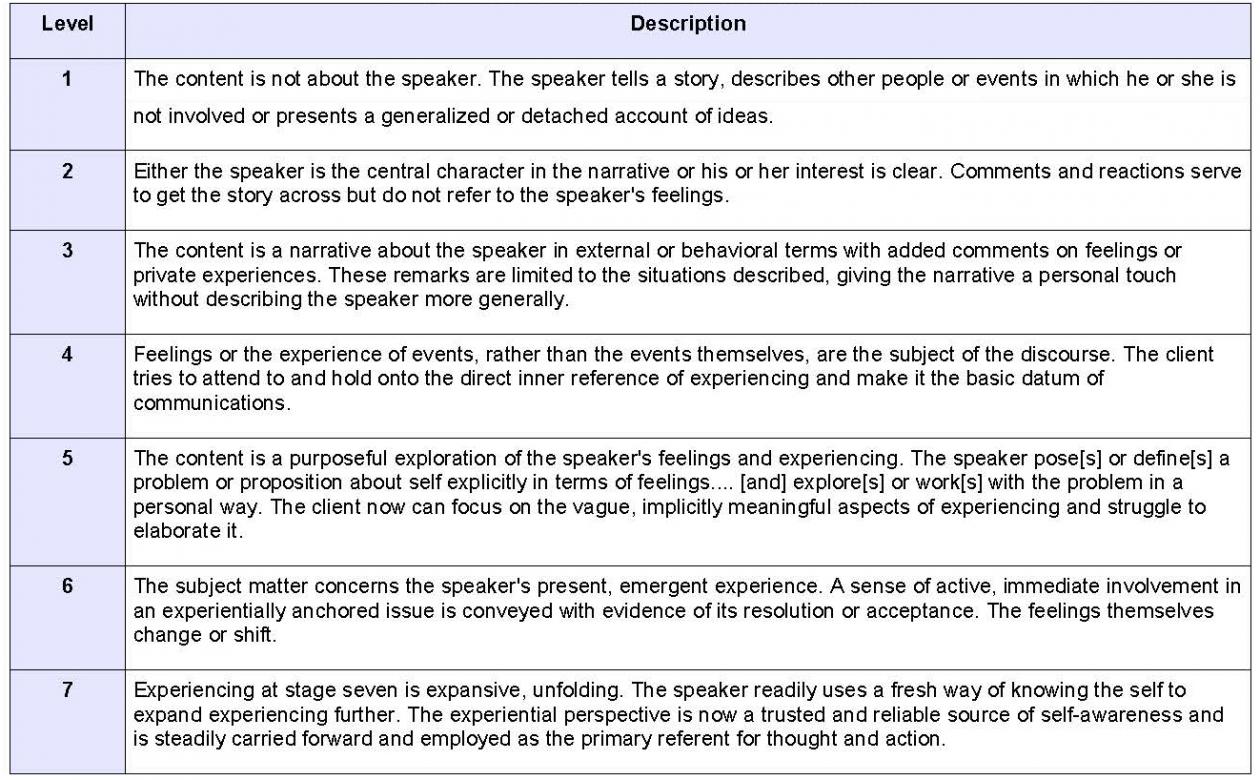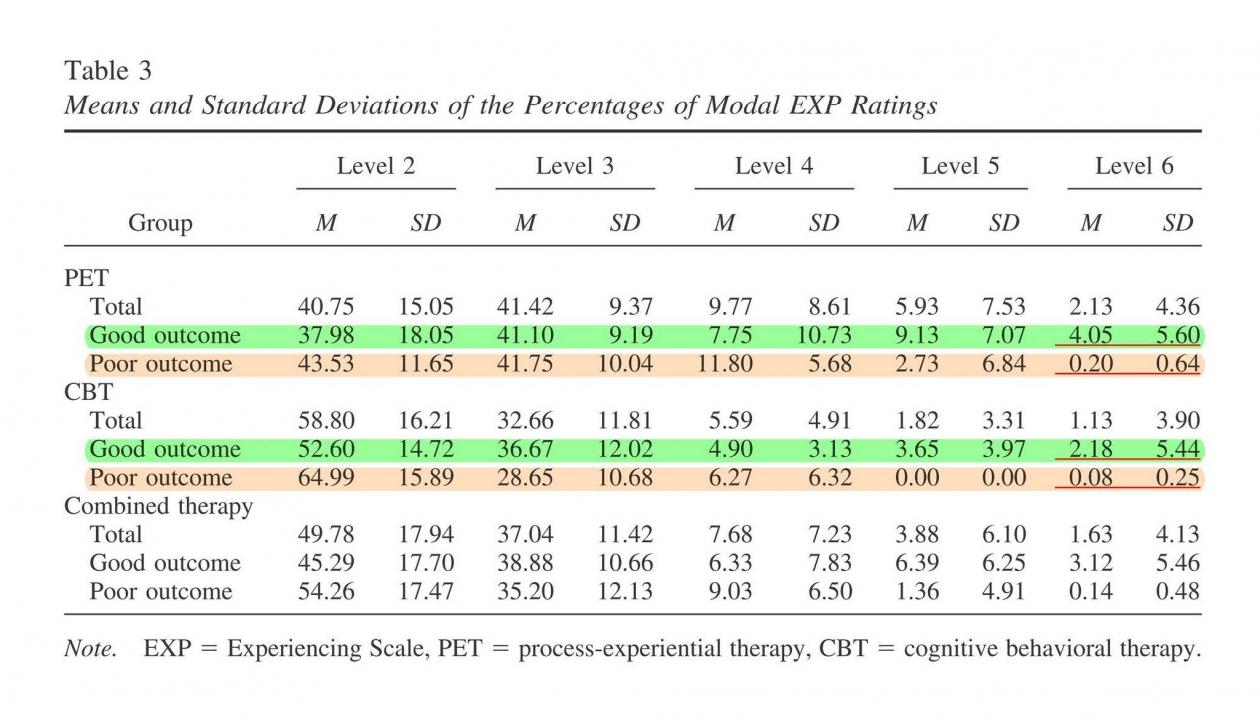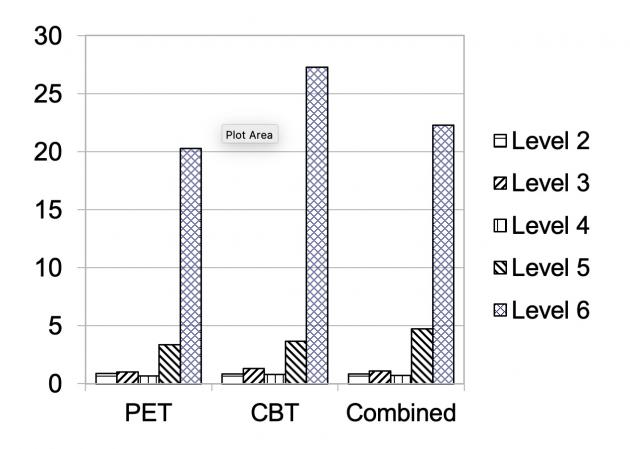Rob Parker, PhD
This is an exciting time to do research on Focusing, first because our theoretical and practical understanding has grown enormously since the early research in the 1960s, and secondly because the absence of experimental research gives the prospective researcher an open field in which to make important new discoveries. For those considering researching some aspect of Focusing, this is a brief overview of the current research and of the most important research questions.
After a period of considerable research in the 1960s and 70s, outcome research on Focusing declined following the cognitive revolution in the 1980s, which focused most research attention onto cognitive behavior therapy. Thus, just as Focusing has been considered indispensable by growing numbers of clinicians, it has been largely ignored by researchers, particularly those with the resources to conduct randomized controlled trials.
The research on Focusing has been summarized in Klein et al., 1970 and 1986; Hendricks, 2002; Krycka and Ikemi, 2016; and Parker, 2014. There are case studies showing how Focusing has contributed to positive outcomes in psychotherapy, studies showing the process of Focusing oriented therapy with considerable depth and precision, and correlational studies showing how attitudes and behavior related to Focusing are related to numerous other psychological and behavioral variables indicative of psychological health and positive functioning. Particularly important in this research is the Focusing Manner Scale (Aoki and lkemi, 2014), which measures “the degree to which Focusing attitudes are present” and has the advantage that it can be easily administered to large numbers of people.
Taken together, these correlational and observational studies show a consistent pattern suggesting that Focusing is helpful in psychotherapy and in a variety of other human endeavors, and how and why that might be true. But there are no RCT outcome studies showing that it actually is true.
A second line of research relevant to Focusing consists of studies that have used the Experiencing (EXP) Scale (Klein et al. 1970; Klein et al., 1986), a seven point scale measuring the extent to which clients interact with their felt experience. The EXP scale was developed in the 1960s as part of the same research that led to Focusing (Klein et al., 1970; Klein et al., 1986), but in recent years it has been used primarily by researchers interested in Emotion Focused Therapy (EFT) and Process Experiential Therapy (PET); summaries of this research can be found in Elliot et al. (2013) and Pascual-Leone, A., & Yeryomenko, N. (2017). Although this research tends to be of very high quality, the use of the EXP scale has tended to be problematic in ways that tell us some important things about about the nature of Focusing, and also suggest some interesting directions for future research.
Measuring Focusing
The EXP scale was developed when Focusing was quite new and arguably not as well understood as it is today. As noted above, Klein et al. designed the scale to measure the extent to which therapy clients refer directly to their immediate experiencing during therapy. They imagined this EXP variable as a continuum, divided into seven levels, with objective third person description at the lowest level, and basic and advanced Focusing at the two highest levels.
The EXP Scale (Klein et al., 1969, pp 56-63):
Over the years, two problems have emerged from this approach. First, the seven level scale requires the rater to make many fine discriminations, which makes it difficult to learn and time-consuming to score.
More importantly, because it was impractical to score an entire course of therapy, it became common to score random samples of the therapy, for example three 20 minute periods randomly selected from the beginning, middle, and the end of therapy. This is a problem because in the decades since the EXP scale was developed, clinical experience has shown that Focusing, i.e., levels six and seven, is much less frequent but much more important for therapeutic change, than the other EXP levels.
Studies going all the way back to Klein et al. (1970) have found that clients do not focus continuously throughout all of their therapy sessions. Most therapy time is spent describing events, situations, and feelings, without Focusing. An experienced focuser with a Focusing oriented therapist, might focus a quarter of the time; but if neither the client nor the therapist know Focusing, then a client might focus for five minutes, three or four times over 12 hours of therapy. In either case, three randomly selected 20 minute segments are unlikely to detect all of the Focusing that goes on, and might not detect any Focusing at all.
The problem is made even worse by the common practice of calculating an average EXP level over a given period of time (Klein et al. 1970; Klein et al., 1986). Because levels one through five are likely to occur much more frequently than levels six and seven, the average EXP is likely to be a low number that that hides any of the Focusing that did happen to be detected.
The problem is evident in two studies. First, Pascal Leon et al. (2016) performed a meta-analysis of EXP studies and found at EXP was only a small to medium predictor of therapy outcome, although it appeared to be a common factor across diverse forms of therapy. This is what we would expect, given our current understanding of Focusing and EXP. Imagine that you want to predict the date by which various Canadian cities are completely free of snow, and you suspect it might have something to do with temperature. So you randomly select one hour in February, one in April, and one in June, and you measure the highest temperature during each of those three hours (or worse, the average temperature for all three hours). Do that across several cities, and you might get a weak correlation between snowmelt and temperature, if you were lucky. This is because because the temperatures below freezing don’t matter, only temperatures above freezing will predict snowmelt. With such limited sampling, most of your data would be noise, and much of the critical data – temperatures above freezing – would be lost. Similarly, because of the way the EXP scale is typically used, Pascal Leon’s results tell us more about the EXP scale than about the relationship between Focusing and therapy outcome.
After another interesting study is by Watson and Bedard (Watson & Bedard, 2006; Parker, 2014), who used data From a larger study of treatment outcomes in two kinds of therapy, CBT and PET. From the total sample in the larger study, Watson and Bedard selected the 10 clients with the best outcomes and the 10 clients with the worst outcomes, for each of the two kinds of therapy (i.e., four groups of 10 subjects each = 40 subjects total).
For each subject they took 20 minutes of recorded therapy interaction from the beginning, middle, and end of therapy (therefore, one hour of therapy recording or each subject). They then scored the modal EXP level for each client statement (defined as everything the client says between therapist statements). Then, taking each group as a whole (good outcome and poor outcome for PET and CBT) they showed the percentage of modal EXP ratings for each group, in the following table:
From this table, a number of interesting observations can be made. A cursory glance at the data shows, as we would expect, that the correlation between average EXP and therapy outcome is very low, because levels 2, 3, and 4 account for over 90% of the speech samples in both CBT and PET. The small percentage of time spent Focusing (Level 6) would be lost when averaged in with the much larger amounts of time spent doing other things. But, again as we would expect, almost all of the Focusing in the four groups was done by the clients who had good outcomes; and this was true both in the PET and the CBT groups. This can be shown graphically when, for each EXP level, we divide the percentage of time spent by the good outcome group divided by the percentage of time spent by the poor outcome group:
Figure 1
Mean percentage of statements at each EXP level, for good outcome clients divided by poor outcome clients. (Note: For CBT Level 5, poor outcome was changed from 0% to 1% to avoid division by zero
This strongly suggests that EXP level six (Focusing) probably has something to do with therapy outcomes. And this result was replicated in two independent samples, with the two different forms of therapy.
Watson and Bedard reported that the difference in level VI activity between good and poor outcome groups, was not significant for the individual treatment groups, but was significant (p < .05) for the combined therapy groups. A glance at the standard deviations shows the reason before this: the good outcome groups had much higher standard deviations at level VI than the low outcome groups. But why would this be?
Obviously, for clients who don't focus, random sampling should produce a consistent result (no Focusing) and thus a low standard deviation. But the clients who do focus, would only focus sometimes, and random sampling might find them Focusing and might not. Therefore, their standard deviation should of course be higher.
Conclusions and future directions
Thus, a close examination of Watson and Bedard’s (2006) study, combined with the other data reported here, leads to the following conclusions:
A considerable amount of diverse data suggests that Focusing is strongly related to therapy outcomes. The fact that this isn’t reflected in the literature can be attributed to a number of factors, including the cultural change in the research community after the cognitive revolution, the inherent difficulties in using the EXP scale (many subtle distinctions requiring much time to learn and also to score) which make research on Focusing more difficult, and finally the way in which the EXP scale has been used (sampling EXP behavior and averaging EXP scores) which has probably obscured the relationship between Focusing and therapy outcome, thus producing less powerful experiments and more type II error.
It is therefore worth noting here that a group at The International Focusing Institute is currently addressing the problems with the EXP scale by creating a new version that is shorter, easier to learn and easier to score. The new EXP II scale is explicitly an ordinal scale for which averaging levels will be inappropriate. The sampling problem is being addressed by making the scale much faster to score, and developing a sampling procedure that targets Focusing. In short, we expect EXP II to be both easier to use and more sensitive, resulting in research designs that are both more powerful and also easier to implement.
Many research opportunities are available. First, testing the new EXP scale for reliability and validity. Then, using EXP II to test the effects of Focusing in many settings such as psychotherapy.
The operational procedure Focusing could also be researched without using any scale at all.
For example, research suggests that Focusing works in very specific ways to help students improve their school performance. In a series of 12 experiments, Zimring found that college students who used Focusing did significantly better than control groups on a number of cognitive tasks related to academic performance (Zimring, 1983, 1985; Zimring & Katz, 1988). First, he found that they did significantly better on the Stroop test, which required them to ignore distractions created by previously learned habits of thinking (Zimring, 1983). In another experiment, he found that students were also able to perform complex mental arithmetic more quickly after Focusing (Zimring, 1983). Exploring the reasons why Focusing improved performance on mental arithmetic, Zimring (1985) found that Focusing improved recall of the internally generated stimuli necessary for that task. Exploring this further, he demonstrated that Focusing increases recall by enriching the network of associations around new information. Students who used Focusing not only formed more associations between new information and pre-existing ideas, they also formed completely new associations to the new information (Zimring & Katz, 1988). The increased associations, of course, resulted in increased learning.
There are many procedures for teaching Focusing, and it would be both interesting and important to learn which of these are more or less effective
In view of the evidence that psychotherapy clients with good outcomes appear much more likely to focus during therapy than clients with poor outcomes, it would be interesting to look at Focusing ability as a personality characteristic, and to ask how stable this characteristic is, i.e., how long does it take a non-focuser to learn Focusing, and what other characteristics are associated with Focusing ability? Findings reported by Gendlin, Beebe, Cassens, Klein & Oberlander (1968) suggest that Focusing ability correlates positively with which Witkin’s construct of psychological differentiation. If confirmed, this finding would have some surprising implications, for example that people in the “hard” sciences such as mathematicians and physicists should learn Focusing more easily than people in the humanities and “soft sciences” such as artists and psychotherapists.
Although the International Focusing Institute is not in a position to conduct research itself, we could assist any researcher with learning or teaching Focusing, learning or using the EXP or EXP II scales, and we could advise on promising avenues for research. We also offer a limited number of research grants every year.
References
Aoki, T., & Ikemi, A. (2014). The Focusing Manner Scale: Its validity, research background and its potential as a measure of embodied experiencing. Person-Centered & Experiential Psychotherapies, 13, 31-46.
Gendlin, E.T., J. Beebe, J. Cassens, M. Klein & M. Oberlander (1968). Focusing ability in psychotherapy, personality and creativity. In J.M. Shlien (Ed.), Research in psychotherapy. Vol. III, pp. 217-241. Washington, DC: APA.
Elliott, R., Watson, J., Greenberg, L.S., Timulak, L., & Freire, E. (2013). 'Research on humanistic-experiential psychotherapies.' In M.J. Lambert (ed), Bergin & Garfield's Handbook of psychotherapy and behavior change (6th ed.). New York: Wiley.
Elliott, R., Watson, J. C., Timulak, L., & Sharbanee, J. (2021). Research on humanistic-experiential psychotherapies: updated review. In M. Barkham, W. Lutz, & L. G. Castonguay (Eds.), Bergin and Garfield's Handbook of Psychotherapy and Behavior Change (7th ed.). John Wiley & Sons Inc..
Hendricks, M. N. (2002). 'Focusing-oriented/experiential psychotherapy: Research and practice.' In D. Cain & J. Seeman (eds) Humanistic Psychotherapies: Handbook of Research and Practice. Washington, DC: American Psychological Association.
Klein, M., Mathieu, P., Gendlin, E. T., & Kiesler, D. J. (1970). The Experiencing Scale: A Research and Training Manual (Vols. 1–2). Madison, WI: Wisconsin Psychiatric Institute, Bureau of Audio Visual Instruction.
Klein, M., Mathieu-Coughlan, P., & Kiesler, D. J. (1986). The experiencing scales. In L. S. Greenberg & W. M. Pinsof (Eds.), The psychotherapeutic process: A research handbook (pp. 21–71). Guilford Press.
Krycka, K. C., & Ikemi, A. (2016). Focusing-oriented–experiential psychotherapy: From research to practice. In D. J. Cain, K. Keenan, & S. Rubin (eds) Humanistic Psychotherapies: Handbook of Research and Practice , Second Edition. Washington, DC: American Psychological Association.
Parker, R. (2014). Focusing oriented therapy: the message from research. In G. Madison (Ed.), The theory and practice of Focusing oriented psychotherapy: Beyond the talking cure. London: Kinglsey.
Pascual-Leone, A., & Yeryomenko, N. (2017). The client “experiencing” scale as a predictor of treatment outcomes: A meta-analysis on psychotherapy process. Psychotherapy Research, 27(6), 653-665.
Watson, J. C., & Bedard, D. L. (2006). Clients’ emotional processing in psychotherapy: A comparison between cognitive-behavioral and process-experiential therapies. Journal of Consulting and Clinical Psychology, 74(1), 152–152–159. doi: 10.1037/0022–006X.74.1.152
Witkin, H. A., Dyk, R. B., Fattuson, H. F., Goodenough, D. R., & Karp, S. A. (1962). Psychological differentiation: Studies of development. New York: Wiley
Zimring, F.R. (1983). Attending to feelings and cognitive performance. Journal of Research and Personality, 17 (3) 288-299.
Zimring, F.R. (1985). The effect of attending to feeling on memory for internally generated stimuli. Journal of Research and Personality, 19 (2) 170-184.
Zimring, F.R., & Katz, K. (1988). Self-focus and relational knowledge. Journal of Research and Personality, 22 (3) 273-289.




